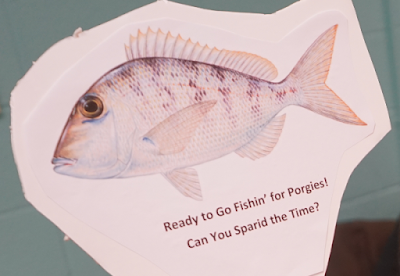The key element for this to work is development of digital
learning networks (aka communities of practice). Online networks facilitate a
“just-in-time” connection with experts. One recent example on Facebook (TM) comes from the All Fish Species Identification group. With over 2,000 members who are respected
fish experts or specialists with identification of many fish families, this is the “go to” group when you have a difficult fish to identify. Photographer Irvin Calicut recently posted a
photo of a heron with a fish and asked "What fish
is this?" Within two days the fish was identified by
member, Grégoire Germeau -- the Grunting Toadfish Allenbatrachus grunniens. This
is only one of many online communities that are being formed every day.
 |
| Heron with unidentified fish. Photo by Irvin Calicut |
Students in Ichthyology class are archiving photos and
drawings from their notebooks to the Ichthyology Class at VT site on Flickr. As we transition into new fish groups, students follow
others on Flickr and invite them to add photos to our photo pool. Witness the addition of a Yellowtail Snapper Ocyurus chrysurus by a professional photographer. The work of experts and novices come together on one network.
Student work gets better over time and there is a record of their early efforts as well as improved sketches, annotations, and photos as the term progress. Social media does not have to make students stupid. Social media is a venue for sharing results of deeper learning activities or exposing shallow learning. As John Dewey wrote many years ago, “Education is a social process; education is growth; education is not preparation for life but is life itself.”
 |
| Photos posted in Ichthyology Class atVT Flickr site. A. closeup of Northern Hogsucker Hypentelium nigricans; B. Breeding tubercles of Bluehead Chub Nocomis leptocephalus; C. Cartilaginous ridge of Central Stoneroller Campostoma anomalum. Photos by D.J. Orth. |
 |
| Example fish meme assists the student in remember new family name |
We have a key role to play in training fisheries
students in the communications of fisheries issues for multiple, diverse audiences
in open-access media. Our youngest
college students are entirely different than 20th century students. In fact a 10-year old, Henry Foster, wrote to Arkansas leaders with suggestions for the state
fish of Arkansas, which led to #GARkansas on Twitter, and an online petition to make the Alligator Gar the official state fish of Arkansas.
In summary, the answer to the question is "YES" -- Social media will empower students. However, we all have be engaged to create authentic online learning networks. To join the network, visit us at Virginia Tech Ichthyology.
Reference
Orth, D.J.
2018. Social media may empower
fisheries students via learning networks.
Fisheries DOI: 10.1002/fsh.10034




Great post, you have pointed out some excellent points, I as well believe this is a very superb website. cheapest smm reseller panel
ReplyDelete